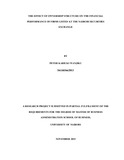| dc.description.abstract | The issue of corporate governance has become obverse and centre of the agenda for both
business leaders and regulators all over the world. Shareholders are always regarded as
the corporate owners, while directors are agents or representatives of shareholders who
are supposed to allocate business resources in a way to increase their wealth. In Kenya, a
number of problems relating to the way companies are controlled and directed have been
identified. These problems range from errors, mistakes to outright fraud. The origins of
these problems range from concentrated ownership, weak incentives, and poor protection
of minority shareholders to weak information standards. The research sought to establish
the effect of ownership structure on the financial performance of firms listed at Nairobi
securities exchange, the study was based on transactions cost theory, the agency theory
and steward theory. Both cross sectional and descriptive survey method were employed.
The target population consisted of all the stocks listed at NSE as at 31st December 2014.
Secondary data was used in this study; specifically the study used financial statements the
data was coded using SPSS (version 21). Descriptive statistics was used to summarize the
data, this included the use of weighted means, standard deviation, SPSS (version 21) has
descriptive statistics features that assisted in variable response comparison and gave clear
indications of response frequencies. Pearson moment correlation was conducted to
establish the linear relationship between study variables. Regression analysis was
conducted to establish the nature of the relationship. The study noted that ownership
structure is one of the most important factors in shaping the corporate governance system
of any country and that study found ownership concentration alleviates the conflict of
interest between owners and managers thus promoting better monitoring, capital
requirements not only strengthen financial stability by providing a larger capital buffer,
but also improve firm’s efficiency, bigger firms are in better position to raise the
barriers of entry to potential entrants as well as gain leverage on the economies of scale to
attain higher profitability, older firms are better experienced in choosing and employing
information, experience and organizational competencies provided by age help firms to
develop their operations in more efficient way, especially the operations relating
innovation. The study concludes that ownership structure, ownership concentration,
increase in firm and firm size had a positive impact of financial performances of
companies listed in NSE. The research recommends that the firms’ should therefore
strike a balance between their choice of capital structure and ownership concentration as
they were found to effect on its performance as it affect the shareholders risks, returns
and the cost of capital. firms should equally watch over growth in financial leverage as
this would undermine their performance, the study recommend that, firm managers
should monitor the institution's growth to ensure that both size and age increase with firm
performance. | en_US |

